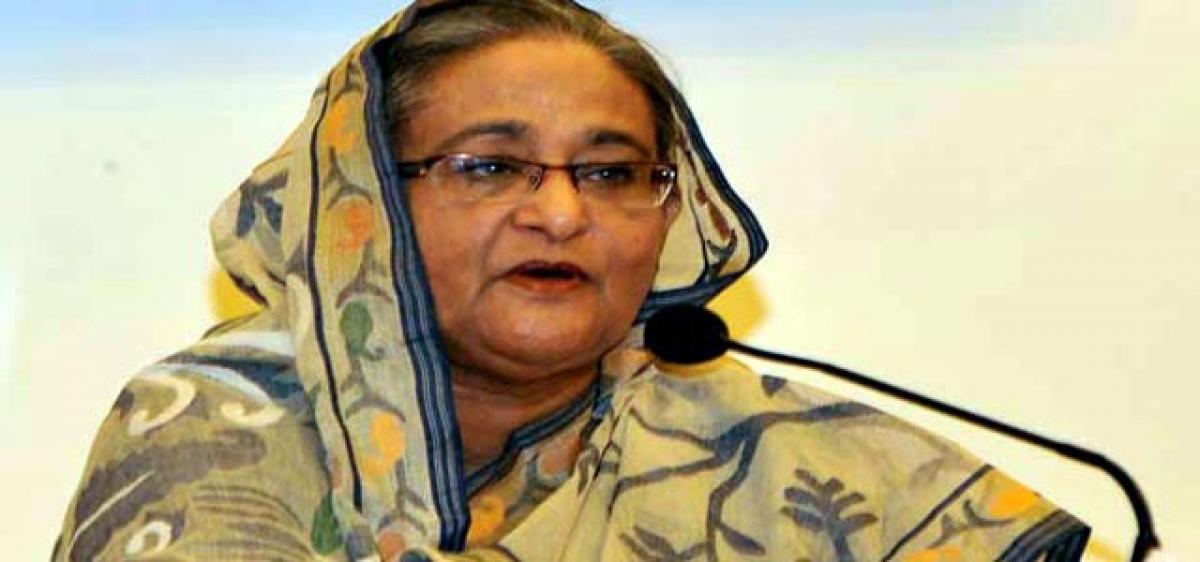Live
- Cop ends life over torture by wife, father-in-law in Bengaluru
- Indian Constitution longest and most beautiful, Kiren Rijiju lauds its inclusive character
- BSNL's Rs 333 Plan Challenges Airtel and Jio with 1300GB Data: Details
- PM Modi's appeal to buy Khadi garments leads to huge demand in Bihar's Samastipur
- Mohammad Amir announces retirement from international cricket
- Chandrababu supports One Nation, One Election System, says elections in 2029
- Cong not pursuing politics of vengeance: D. K. Shivakumar on Covid 'scam' FIR
- Mexican consulates to strengthen support for nationals in face of US deportation
- Minister Meghwal to table ‘One Nation, One Election’ Bill in Lok Sabha on Monday
- 3rd Test: Day one’s play at the Gabba called off due to persistent rain
Just In

India and Bangladesh, two South Asian democracies, are also neighbours with the longest common border of over 4,000 km. They are also partners in progress and development and have, over the last seven years, been able to sketch out an increasingly deepening engagement trajectory.
India and Bangladesh, two South Asian democracies, are also neighbours with the longest common border of over 4,000 km. They are also partners in progress and development and have, over the last seven years, been able to sketch out an increasingly deepening engagement trajectory.
Bilateral Bonhomie
- Growing defence cooperation
- Several infrastructure projects
- Trade facilitation treaty,
- Cross-border linkages
- Hasina maintains excellent ties
The governments on both sides would want to showcase their bilateral partnership in the region. Political leaders appear invested with each other and have gradually, especially since 2010, been able to widen the bilateral scope to even include defence cooperation in recent times. The development of large and small infrastructure projects, trade facilitation, cross-border linkages and security cooperation are some of the salient features of this evolving relationship.
Clearly there is much to rejoice in bilateral ties between the two neighbours at present. It would be no exaggeration to state that India and Bangladesh are enjoying the most comprehensive bilateral engagement since they established diplomatic ties in 1971, immediately after that country's independence from Pakistan. But we need to ask whether the evolving momentum can be sustained and, more pertinently, can this process be made irreversible?
The past four decades have been witness to periods of stagnant and uneven phases between the neighbours. While the two bilateral agreements signed in 2010 and subsequently in 2015, including the resolution of the border alignment, have placed the two neighbours on a firm footing, India has time and again been accused of not providing a level playing field to Bangladesh.
Indeed, foreign policy is a factor of the domestic ground reality as well as perceptions which may not reflect the ground position. Both these factors assume greater salience in Bangladesh, specially vis-a-vis India. Bangladesh's is also a deeply divided polity. The Awami League's return to power in 2014 was under rather piquant domestic circumstances. Suffice to say that the Awami League can be far from complacent about the next electoral outcome in less than two years.
As is widely known, due to historical reasons, India has been closely associated with the Awami League and its late leader, Bangabandhu Sheikh Mujibur Rahman. This legacy has been carried forward by his daughter, the present Bangladeshi Prime Minister, Sheikh Hasina. Both in her capacity as leader of the Awami League and as the head of the government she has maintained excellent relations with India.
Despite the bilateral bonhomie, Bangladesh is unhappy about the lack of resolution on all the common rivers. While India did put the river Teesta on the bilateral discussion table, the federal political dynamics has prevented the Centre from resolving the issue of water-sharing overruling Bengal's position. Irrespective of the number of outstanding bilateral issues being resolved, lack of resolution on the contentious issue of sharing of common river waters tends to create despair if not suspicion of India's intention in Bangladesh.
This issue has been rankling since 2015 and a recent attempt by the Narendra Modi government to renegotiate with Bengal over this appears to have drawn a blank. While New Delhi can legitimately move ahead on a bilateral resolution, it may not want to give Bengal, led by the feisty Chief Minister Mamata Banerjee, a handle to spin yet another round of dance and drama just now as she had done earlier over the Teesta water-sharing issue.
Apart from other joint projects encompassing infrastructure and energy, the new item being speculated on the bilateral table is that of a defence agreement. A defence cooperation agreement with an important neighbour would be a feather in India's cap, but what would it entail for Bangladesh? Anything that involves purchasing Indian defence equipment and hardware may not go down well with Bangladesh.
In the wake of the Indian decision to fully fence the India-Bangladesh land border, the mood across the frontier may not be very indulgent. Sheikh Hasina needs a gift to take back to Dhaka, not a compromise package.
By Sreeradha Datta

© 2024 Hyderabad Media House Limited/The Hans India. All rights reserved. Powered by hocalwire.com







